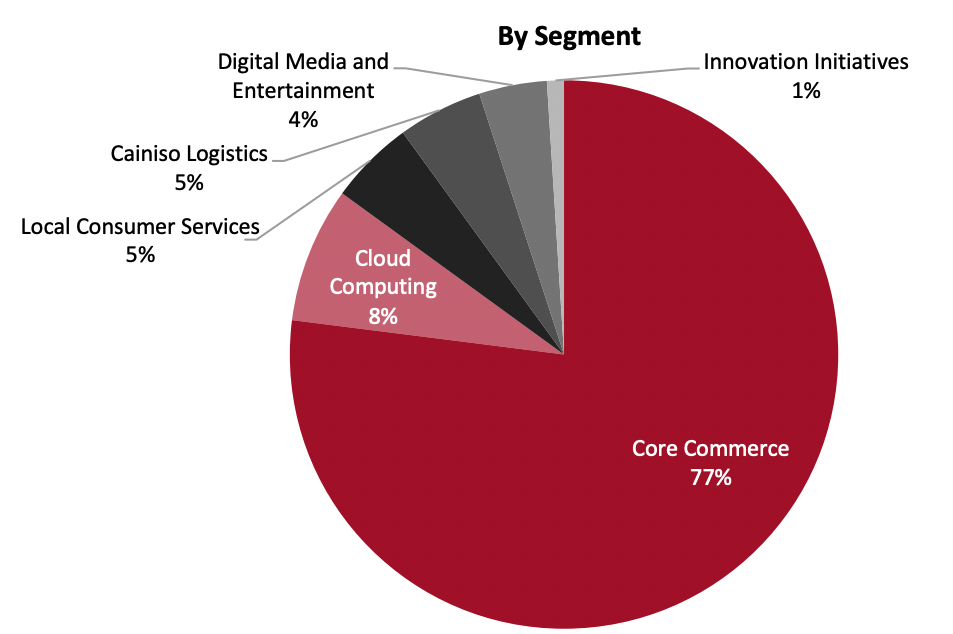
albert Chan
Alibaba
Sector: E-commerce Countries of operation: Australia, China, Indonesia, Malaysia, Singapore, Thailand, the UK, the US and Vietnam Key product categories: Beauty, consumer goods, electronics, fashion and home Annual Metrics [caption id="attachment_151256" align="aligncenter" width="700"] Fiscal year ends on March 31
Fiscal year ends on March 31*Gross Merchandise Value of the company’s China retail marketplaces, including Tmall and Taobao[/caption] Summary Founded in 1999 and based in Hangzhou, China, Alibaba Group Holding Ltd. is an e-commerce company that operates through various subsidiaries in China and internationally. Alibaba provides the technological infrastructure and marketing reach to help merchants and brands sell and operate in a more efficient way. Its mission is “to make it easy to do business anywhere in the digital era.” The company operates in four segments: Core Commerce, Cloud Computing, Digital Media and Entertainment, and Innovation Initiatives and Others. In addition, its unconsolidated related party Ant Group offers payment and financial services for consumers and merchants. Alibaba has built a digital economy that consists of consumers, merchants, brands, third-party service providers, strategic-alliance partners and other businesses. Company Analysis Coresight Research insight: As the leading e-commerce giant in China, Alibaba is well positioned to greatly capitalize on the digitalization trend in the post-pandemic environment. The company’s growth is driven by its Core Commerce and Cloud Computing segments. Alibaba reported that its largest share of revenue came from domestic e-commerce retail platforms such as Taobao and Tmall, earning the company ¥473.7 billion in 2021, ¥140 billion more than in 2020, according to its annual report. The company has focused on growing lower-tier markets in China through its online marketplaces Taobao Deals and Taocaicai, which leverage the group’s supply chain network, Cainiao, to source high-quality products at competitive prices. Meanwhile, technological innovation and integration across its portfolio is the backbone of Alibaba’s success, increasing efficiency and bringing more users to its platforms, and we expect it to remain so for the foreseeable future. Alibaba still faces a highly competitive e-commerce market in China, with new players in the social media and short video platform segments giving shoppers more options. In addition, the ongoing trade war with the US and recent crackdowns on the technology sector conducted by the Chinese government, including the antitrust case brought against Alibaba in 2021, have negatively impacted its business.
| Tailwinds | Headwinds |
|
|
- Expand the product and service offerings across Alibaba’s digital economy, including financial services, healthcare, local consumer services, media and entertainment, physical and virtual goods, and travel
- Use technology to combine online and offline retail to improve the user experience
- Attract merchants and address consumption in lower-tier and agricultural markets
- Extend into new business verticals, including by acquisitions and expansions
- Serve more users outside of China, starting with Southeast Asia
- Invest in technology to support the digitalization of underdeveloped areas
- Support the growth of small and medium-sized enterprises (SMEs), including their expansion into overseas markets
- Digitize supply chains
- Upgrade IT infrastructure to use cloud technology
- Use consumer data and machine learning to drive business decisions and meet consumers’ unique demand
- Develop omnichannel strategies via digital supply chain and location-based fulfillment
- Invest in cloud computing platforms
- Develop innovative solutions to serve consumers, merchants and partners
 Source: Company reports[/caption]
Company Developments
Source: Company reports[/caption]
Company Developments
| Date | Development |
| May 26, 2022 | Alibaba achieves a record global gross merchandise value (GMV) of ¥8,317 billion in fiscal 2022 fiscal, a company record, and reaches a historic milestone of over 1 billion users |
| April 21, 2022 | Alibaba joins the Low Carbon Patent Pledge, an international platform that encourages the sharing of low carbon technologies to accelerate the adoption of green technology |
| December 17, 2021 | Alibaba announces target of $100 billion GMV for Lazada, its Southeast Asian e-commerce arm |
| December 17, 2021 | Alibaba pledges to achieve carbon neutrality by 2030 and adopts more sustainability measures |
| December 6, 2021 | Alibaba announces that Toby Xu will succeed Maggie Wu as CFO effective April 1, 2022 |
| November 11, 2021 | Alibaba records record sales of $84.5 billion during Singles’ Day 2021 |
| June 7, 2021 | Alibaba invests $1 billion in Asia tech startups |
| June 1, 2021 | Alibaba plans to open 10 more membership-only wholesale stores by the end of 2021 |
| April 10, 2021 | Alibaba is fined $2.8 billion in landmark antitrust case |
| March 26, 2021 | Alibaba Cloud announces a cooperation agreement with Hang Seng Bank to improve corporate customer service. |
| February 25, 2021 | Alibaba invests in community group-buying platform Caihuasuan in a strategic funding round for an undisclosed amount. |
| December 3, 2020 | Alibaba Cloud revamps its hybrid cloud strategy with newly upgraded product offerings to bring reliable and productive cloud solutions to enterprises. |
| November 12, 2020 | Alibaba reports $74.1 billion in GMV generated during the 2020 11.11 Global Shopping Festival. |
| November 5, 2020 | Alibaba and luxury goods holding company Richemont announce plan to invest $600 million into online luxury fashion retail platform Farfetch and $500 million into a new joint venture, Farfetch China. |
| November 5, 2020 | Alibaba delivers a solid second fiscal quarter of 2021, with revenue growth of 30% year over year and increase of 9.2% in annual active consumers. |
| November 3, 2020 | Alibaba and Malaysia Airports’ Aeropolis announce the operation commencement of the new e-commerce logistics hub operated by Alibaba’s logistics arm Cainiao. |
| October 26, 2020 | Alibaba and BMW form a strategic partnership to promote digital transformation across BMW’s full business process and enable dealers to provide an online-to-offline digital experience to consumers. |
| October 19, 2020 | Alibaba invests around $3.6 billion, becoming the controlling shareholder in Sun Art Retail, a leading supermarket operator in China. |
| October 5, 2020 | Alibaba announces plans to acquire up to a 10% stake in duty-free giant Dufry. |
| September 18, 2020 | Alibaba lays out its long-term vision and the outlooks of its key businesses during its Investor Day 2020. |
| September 17, 2020 | Alibaba Cloud debuts its first cloud computer and autonomous logistics robots for last-mile deliveries at Cloud Computing Conference. |
| September 16, 2020 | Alibaba unveils its New Manufacturing digital factory Xunxi, offering small and medium-sized enterprises a digitalized manufacturing supply chain that allows for fully customized, demand-driven production. |
| September 1, 2020 | Alibaba increases its stake in Chinese logistics firm YTO Express from 12% to 22.5%. |
| August 25, 2020 | Tmall Luxury announces three new features—Soho Live, Soho Mag and an upgraded membership program to bolster luxury brands’ connections with China’s Gen Z consumers. |
| August 11, 2020 | Alibaba partners with energy company Total (China) Investment, using Alibaba Business Operating System to drive its digital transformation. |
| July 20, 2020 | Alibaba introduces Starbucks’ mobile order and pay feature “Starbucks Now” to four Alibaba’s apps, including Taobao, map provider Amap, local services provider Koubei and Alipay. |
| June 23, 2020 | Alibaba’s logistics arm Cainiao announces increased investment in its network to improve efficiency and significantly slash delivery times over the next three years. |
- Yong Zhang—CEO and Executive Chairman
- Joseph Tsai—Executive Vice Chairman
- Michael Evans—President and Director
- Toby Xu—Chief Financial Officer
- Li Cheng—Chief Technology Officer
- Chris Tung—Chief Marketing Officer
Source: Company reports/S&P Capital IQ